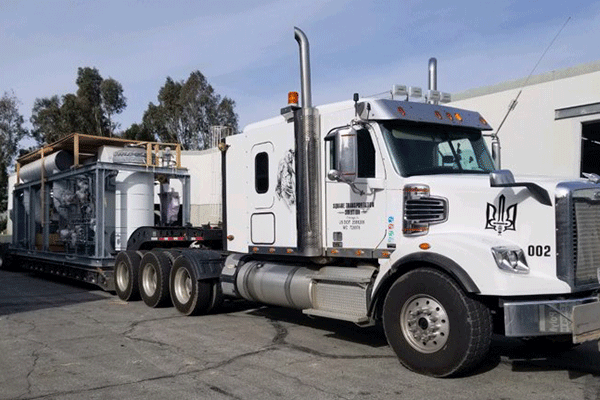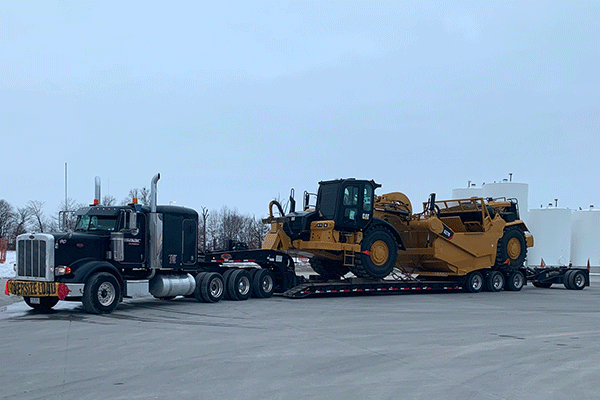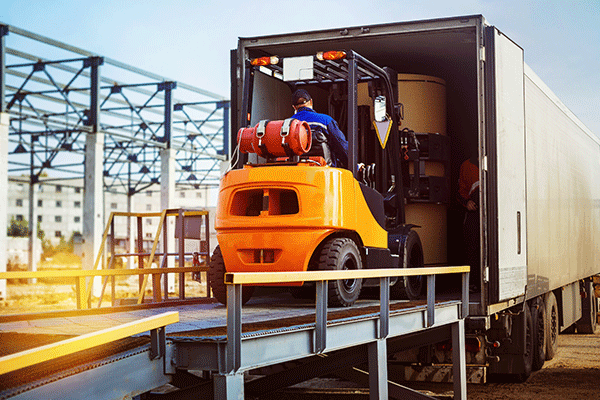If you’re a shipper wondering what steps a freight brokerage will take to promote the safety of your cargo and all those involved in its transport, we don’t blame you. Without understanding the steps that can be taken to promote safety in the trucking industry, you may be left feeling uneasy about trusting a third party.
Throughout our years in this industry, here at ATS, we’ve taken pride in our safety protocols and practices as a freight broker.
In this blog, we’ll outline the steps that every good freight brokerage should take to promote safety in their organization and to do their part to keep cargo, and all of the lives it passes by while in transit, safe.
A good freight brokerage is in safety mode from the moment it turns the lights on in the morning until well after its customers have gone to sleep. For these brokerages, promoting the safety of your freight, and all those involved in its transportation is priority number one.
Determining Whether a Freight Brokerage Has a Culture of Safety
To encourage the transportation of your freight in the safest possible way, a freight brokerage must have a systematic culture of safety. By this, I mean that from the corner offices to the front desk, safety must live in every crevice of a freight brokerage’s ecosystem.
A freight brokerage’s dedication to safety can be a large selling point of their partnership. If done correctly, a freight brokerage with a practicing culture of safety will, in the long run, be able to translate this into extra savings for their clients.
But how can you determine if a freight brokerage has an active culture of safety?
Here are some questions to ask your potential provider to help you more clearly determine whether their safety standards are truly up to par:
- What does safety mean to you?
- Do you have a department dedicated to safety?
- What is your carrier vetting process?
- How do you train your employees on safe practices?
- What steps will you take to promote the safe transportation of my freight?
Questioning your freight brokerage about its safety practices will go a long way toward determining whether it’s the right fit for you.
A huge indicator of a freight brokerage’s dedication to safety is found by examining its carrier vetting process. In the pursuit of a safer supply chain, choosing quality carriers is step one.
Related Content: The Ultimate Guide to Freight Brokerage (Your Comprehensive Guide to Understanding the Business of Freight Brokerage
Working With Safe Freight Carriers
Just like any other form of business, quality control is a stepping stone to success. As such, the titans of safety in freight brokerage work tirelessly to whittle down the number of carriers they work with. These safety pioneers always prioritize quality over quantity in the creation of their carrier network.
Through its meticulous carrier vetting process, a good freight brokerage can avoid the shipping mishaps that non-reputable carriers tend to create. This process is complex and the right freight brokerage will never cut corners when selecting a carrier.
By using the tools listed below, a good freight brokerage can promote safety.
Broker-Carrier Agreement
This agreement is required to be signed, sealed and dated before a freight broker assigns freight of any kind. The Broker-Carrier Agreement is an exercise in the communication of expectations between a brokerage and their partner carrier.
These agreements are designed to hold each party accountable. Questions like “Who’s responsible for making sure the carrier has all the tools they need to safely deliver a load?” and “When/how much will the carrier be paid?” are answered.
Additionally, these agreements serve as a method to communicate the limits of liability on each side.
By having a clear understanding of, and a contract outlining, the expectations on both sides, the safe transport of a load becomes more manageable.
Promoting Carrier Safety Using Automation Technologies
The automated systems available to monitor and promote the safety of a freight brokerage’s carrier network should be utilized. When they are used correctly, these technologies can result in the highest level of quality control.
Great freight brokerages will put automated systems in place that restrict the assignment of a load when certain criteria aren't met by the carrier. These systems are refreshed at regularly scheduled intervals providing the most up-to-date data available for a brokerage to work with.
Human beings, when left to their own devices, are prone to error. Things slip by unchecked when stimuli are overloaded and plates are overflowing. Good freight brokerages understand this and employ systems to prevent such errors. These automation technologies create a system of checks and balances to prevent these human-related errors.
A Carrier’s Active Authority
A carrier’s active authority is its ability to be “for hire.” This ability is dictated by several different criteria that must be met. Using automated systems, a freight brokerage can certify that every member of their carrier network has met all necessary criteria.
When these stipulations are not met, the freight brokerage must notify each carrier that they don’t have the appropriate authority to haul a load. In these instances, freight brokerages sideline the carriers without active authority until their situation is amended.
These industry benchmarks that must be hit for a carrier’s active authority to be approved, include but are not limited to:
- Proof of insurance and governmental stipulations
- Automobile insurance (must have the minimum level for commercial use)
- General liability insurance
- Cargo Insurance
What Happens When Authority is Lost During Transit?
Sometimes a carrier’s authority is lost after they have already begun the process of hauling a load. In these instances, an automated email notification is sent to all stakeholders. This email is sent to make sure that everyone is on the same page.
This may happen if the carrier has failed to submit proof of insurance to the Federal Motor Carrier Safety Association. Frequently, brokerages may have to notify the carrier of their loss of authority. A good freight broker will then work to find a new carrier for its customers' freight.
Although this may result in a delay in the delivery of shippers freight, a brokerage with the correct culture will always prioritize safety.
Automated 90-Day Authority Restriction
A common limitation used in a freight brokerage’s promotion of safety is an automated 90-day authority restriction.
Often, the trucking partners that freight brokerages contract are known as owner operators. These carriers are individuals who either own or lease their trucks. As such, these independent truck drivers operate their own carrier business. Because of their small size and low overhead, these carriers can enter the transportation market with relative ease.
Using this tool as a filter, a freight brokerage may not work with any carrier that has been operating in the market for less than 90 days (as an example of a policy a broker may have). It is not until the 91st day that these systems will allow their brokerage to view these carriers as a viable option.
A freight brokerage’s automated 90-day authority restriction acts as a valuable tool in the prevention of fraud and the facilitation of safety. Activities such as “double brokering” and “holding a load hostage” are avoided using these systems.
Automated Dispatch Restriction for Safety Ratings
Just like you wouldn’t buy a car without seatbelts, a freight brokerage with the proper culture of safety won’t partner with a carrier that has a proven history of unsafe practices. This is where the automated dispatch restriction for safety ratings comes into play.
A safety rating in the trucking industry is measured based on a carrier’s administrative adherence to all laws and guidelines.
Carriers are audited for these guidelines by the Federal Motor Carrier Safety Association (FMCSA). The FMCSA is a government organization that monitors the trucking industry as a whole.
Following the FMCSA’s audit — occurring within 12 months of their introduction to the market — carriers are given a safety rating.
These ratings are categorized as follows:
None: The rating given to a carrier who has not yet been audited by the FMCSA. This rating is considered to be admissible and carriers with this rating are widely accepted by reputable brokerages.
Satisfactory: This rating is given to a carrier who either meets or exceeds the FMCSA’s guidelines for administrative safety practices.
Conditional: A rating that is given when most of the FMCSA’s safety guidelines are met.
Unsatisfactory: This rating is applied to a company who — following its audit — is found to have a large number of deficiencies.
Generally, freight brokerages will work with carriers who grade “conditional” and above. The best brokerages however will only do business with carriers that have a safety rating of “none” or “satisfactory”.
Once again, the safest freight brokerages always prioritize quality over quantity, especially in their carrier network.
Automated 3rd Party Reporting
3rd party reporting systems are another excellent tool used in the freight brokerage carrier vetting process. These third-party systems help brokerages by providing a record of carrier histories for them to check on.
By using third-party systems such as TIAWatchDog, Carrier 411 or Freight Guard, a freight brokerage can check in on a prospective carrier's history in the industry. Doing so allows brokerages to “no-load” any carrier with a history of the fraud activities mentioned above (double brokering, holding loads hostage, etc.).
The safest freight brokerages can integrate the use of these 3rd party systems directly into their regularly scheduled safety automation processes. This allows brokerages to certify they are working with the highest tier of carriers at all times.
How Working With a Safe Brokerage Benefits Customers
The value a shipper gains, when they partner with a brokerage that puts safety first, can be categorized in two ways:
- Protecting their commodity
- Protecting their reputation
Protecting Their Commodity
Working with a freight brokerage who prioritizes safety, who isn’t afraid to turn down a shipment they cannot handle and who only works with the best carriers, will pay off in the end.
When you choose to partner with one of these brokerages you can rest assured that your freight, the commodity essential to your business, is in capable hands. You don’t need to worry that it will get to its destination on time and in one piece. It just will.
Protecting Their Reputation
In the business world, nothing is more valuable to a company than its reputation. Maintaining a good reputation is integral to finding success. That said, the partnerships you enter and the company you keep directly correlate to the way you are perceived.
If you want to foster a reputation of safety, reliability and integrity in your industry, choose your partnerships wisely. By partnering with a safe freight brokerage you will be protecting not only your cargo and the people involved in its transportation but the reputation of your company.
Your Next Step Toward Supply Chain Safety
To a good freight brokerage, safety is everything.
Choose a transportation partner who shows vigilance in its carrier vetting process.
Choose a transportation partner who boasts a top-down culture of safety.
Look beyond your bottom line. Safety, like success, comes at a price. You will find that the price you pay by using an unsafe brokerage extends well beyond your balance sheet. When selecting a partner, ask about their safety practices.
If you would like to learn more about the transportation industry, check out a few more of our blogs. As always, please remember that we are here to help you with any questions/concerns you may have.





